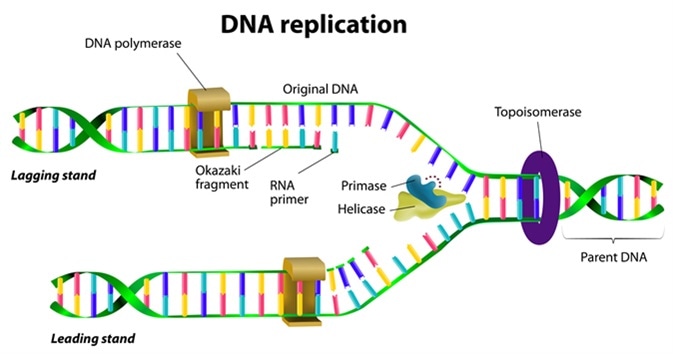DNA replication and repair are critical processes that ensure the correct genetic material of a biological system is carried on. DNA continually undergoes a process of replication and division and errors can sometimes occur in the process. It is essential for the biological system to have a mechanism in place to detect and repair these errors.

DNA replication - Image Credit: Designua / Shutterstock
Principles of DNA Replication
In order for DNA to be replicated correctly, there are several guiding principles that should be present, including:
- DNA in a state ready to begin the process of replication
- Clear starting to commence the replication
- Ending point to finish the DNA copy
- Proofreading and repair mechanism in place to detect any errors
- Ability to distinguish between the original and copy of DNA
Stages of DNA and Cell Replication
The cell cycle of eukaryote cells includes four main phases for the replication of DNA and new cells:
- G1 phase: the first gap phase, when the cell prepares for division with metabolic changes.
- S phase: the synthesis phase, when the DNA and genetic material of the cell are duplicated, forming two sister chromatids.
- G2 phase: the second gap phase, when cytoplasmic materials needed for division are gathered with metabolic changes.
- M phase: the mitosis phase, when the genetic material and the cell divide.
The actual DNA replication occurs during the synthesis (S) phase, when two copies of the original cell DNA are produced, each containing one original and one new strand of DNA.
DNA Replication Animation - Super EASY
DNA Strand Mismatch Repair
During the process of DNA replication, errors can sometimes occur. Nucleotide bases may be inserted, deleted, or mismatched into the DNA strand incorrectly. For this reason, it is important for the biological system to have mechanisms in place to detect and repair these errors.
Mismatch errors are relatively common in the new copy strand of DNA, but it is possible for the repair mechanism to detect these by comparing it to the original strand. This system helps detect DNA helix distortions, distinguish between the two strands, and remove replication errors.
DNA Repair
The DNA repair system of the human body is very efficient and does not allow the vast majority of variations in DNA that occur due to the continuous replication process to be retained. It is essential for DNA to be able to be repaired to enable the body to function in a healthy manner.
DNA repair can occur at various points in the cell cycle, as outlined below:
- G1 phase: prevents the replication of errors by halting in this phase
- S phase: prevents the replication of errors by stopping replicon initiation inhibition
- G2: protects against mitotic errors by delaying the metabolic changes
Base excision repair (BER) is a mechanism that helps protect cells from erroneous DNA by repairing damage throughout the cell cycle. In particular, it helps remove small lesions from the genome that generally do not distort the shape of the DNA helix. It can remove damaged bases from DNA that could eventually lead to more serious mutations of mispairing of DNA breaks. DNA glycosylases detect and remove the damaged bases to form sites that are then cleaved away by endonucleases.
When there is more serious damage to DNA, such as a break in both strands of the DNA, it is still possible for it to be repaired. The original DNA sequence can be altered with the deletion or insertion of bases during repair, known as non-homologous end-joining repair, or the correct information may be transferred from the intact strand, known as homologous end-joining repair.
References
Further Reading